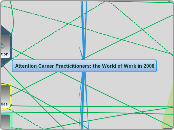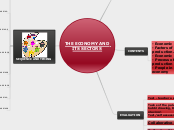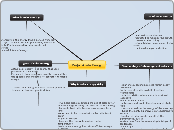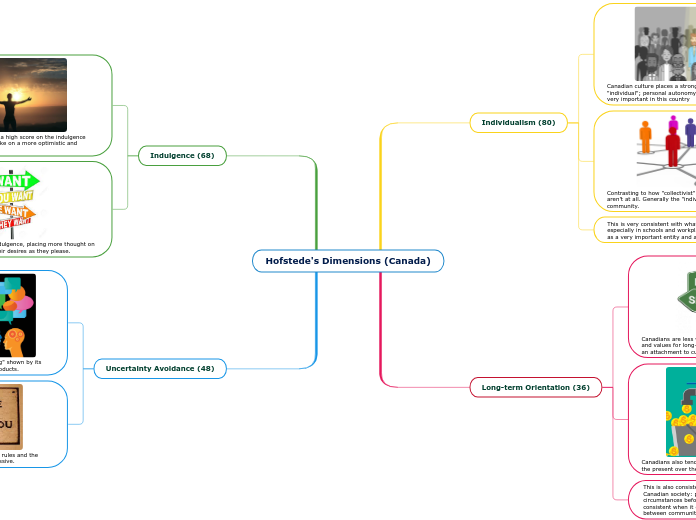Attention Career Practicitioners: the World of Work in 2008
Economy
Shareholders drive business decisions
Growth
Increased efficiency and production
Inflation
Salaries don't rise
Individuals struggle
Competition for well-paying jobs
Trade
Free trade
Restrictions
Reduces profit potential
Reduces level playing field
Countries integrated
Types of Career Paths
Untouchables
Specialized knowledge and skills
Transitory
Allows for fulfilling work
Steady-street
Even in changing world of work, these occupations will still be needed
Linear
Will be less likely in a flatter world
Individuals like for security
Spiral
Requires re-education
More common in a changing world
Environment Concerns
New technologies needed
Creation of jobs
Companies
Social Responsibility
Individuals
Developing Countries
Jobs moved from North America
Require education
Increase in opportunities for individuals to earn a living wage
What about those discluded?
Affect of increased income on family
Education
Need to learn how to learn
Transferable skill to new job
Lack of education
Individuals unable to be competitive
Need re-education
On-the-job education
Types of Learners
Echo generation
Hands-on, practical education
Customized to job area
Post-secondary education
Lack of funding for research
Less research
Less innovation
Increasing participation rate
Increasing in humanities and social science
Doesn't address skills shortages in technical occupations
Good for ensuring we have critical thinkers
Decreasing in math and science
Globalization
Competition
Comparative advantage
Opportunities for creativity
Think about the world, not your own region/country
Ethics
Exploitation - not as level a playing field
More level playing field
Governments change policies to level playing field
Integration of people
Understanding of different cultures
Facilitated by technology
Flatteners - removing geo-political boundaries
Work Flow Software
Facilitates communication
Between employees in different locations
New innovations sparked
Fall of the Berlin Wall
New opportunities for creativity
Countries move to free-market capitalism
The Steroids
Speed of change
Individuals are left behind
In-forming
Equalizes access to information
Infrastructure needed for access
Creates jobs
Awareness
Educated citizens
Insourcing
New business opportunity for small businesses
Supply-Chaining
Save money
Produce products as cheaply as possible
Potential human rights abuses
Challenge to be efficient
Requires new technology
Efficient transportation of products
Offshoring
Potential for human rights abuses
Individuals join unions
Multinationals move to different country
New jobs in the developing world
Jobs change in developed world to more knowledge-based
Loss of manufacturing jobs
Employees need to be re-educated
Uploading
Different viewpoints
Research solutions to problems
Citizens are more educated
Accuracy of uploaded content
Education needed to determine accuracy
Individuals have ability to create information
More information available
Internet available to public
Who has access?
Those without are disadvantaged
Easier to find information
Outsourcing
Reduces lower prestige jobs in developed world
Collaboration
India
Provide labour for large-scale projects
Technology
Increased ability to learn
Human interaction
Different types of communities
More virtual
Less face-to-face
Rapidly changing
Need to adapt
Changes in work processes
Ongoing education
Jobs change
Workers need more education
Potential for more efficient work
Workers replaced by technology
Require skills in math and science
Search engine optimizer
Facilitates outsourcing
Personal Career Interests
Job security
"Survival strategy"
Adaptability will give more potential for success
New jobs created that match interests
Innovation comes from passionate workers
Limits based on labour market availability
Worker frustration
Requires new education
Demographics
Demographics in other countries
Impact of China's one-child policy
Half of India's population under 25
Large pool of labour
Cheaper for North American compnies to access labour
Psychographics
Tribes
Identity to a group
Ability to forecast future
Employment trends
New employment areas created
Immigration
Needed to compensate for lower birth and fertility rates
Baby Bust
Didn't experience competition for jobs
Management is flooded with Boomers
Echo
Open mind in pursuing work helps lead to success
Expectations for flexible work environment where they have input and impact
High comfort level with technology
Entering multigenerational workforce
Baby Boomers
More diffculty or lack of interest in embracing technology
Requiring services (health, recreation, etc.)
New jobs created
Interest in social issues
Large number creates more awareness of concerns/needs
Looking for flexible work schedule
Concerned about finances in retirement
Retiring later









